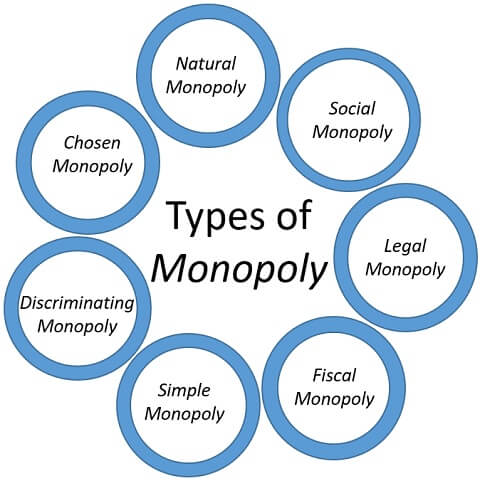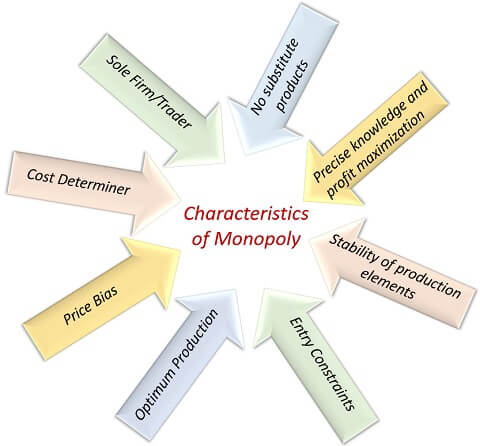Definition: Monopoly is one of the extreme imperfect markets amongst Monopoly, Monopolistic Competition and Oligopoly as it lacks several characteristics of perfect competition and it exists where a single firm rules the industry.
The word Monopoly is a combination of two words in which “mono” implies “single” and “poly” means “seller”. Therefore, the market controlled by a sole trader is said to a Monopoly market.
Content: Monopoly
Types of Monopoly
Monopoly has the following types:

- Natural Monopoly
It depends upon the natural factors of the area such as Karnataka has a Monopoly of the coffee market as the climate of Karnataka suits best for coffee cultivation. - Social Monopoly
When the government controls the production for public welfare, it is said to be a social monopoly. - Legal Monopoly
It is a Monopoly which arises because of legal barriers or provisions such as copyrights; the law prohibits an action of replicating any design registered under a particular brand name. - Fiscal Monopoly
The government governs this Monopoly for printing currency and the minting of coins, etc. - Simple Monopoly
In this type of Monopoly, uniform charges are charged by the traders to all the buyers for its products. - Discriminating Monopoly
It discriminates amongst the buyers for selling similar products, different prices are charged on divergent buyers such as lawyer charges different fees from his every client. - Chosen Monopoly
This type of Monopoly comes into existence to avoid the throat-cutting competition in the market and creates a group of monopolists to escalate their profits.
One of the best examples of this type of Monopoly is (OPEC) Organization of Petroleum Exporting Countries.
Characteristics of Monopoly
The following are some of the characteristics of Monopoly:

- Sole Firm/ Trader
Monopoly market is solely captured by an individual seller or firm of a particular commodity having no competitors in the market, the whole output of such commodity depends upon that firm or trader; thus they form industry with a Monopoly.
- Cost determiner
As the Monopolist is the sole king of that industry, he also determines the cost of the commodity produced, and there is no one in the market as a competitor who can challenge his price and the value decided by him becomes the final price of that product to sell in the market.
- Price Bias
As the monopolist is a sole trader of that commodity in the whole market, he may be biased amidst customers, i.e., can charge more from rich and low from poor customers.
- Optimum Production
Production in the Monopoly market should be in optimum scale as supply rise may bring fall in the price of the product.
- No substitute products
The monopoly firm or trader captures an entire market of the product as they have the patent of that product; thus, no substitute products can be produced and sold in the market by other firms.
- Entry constraints
Entering in the Monopoly market is restricted for the firms as the monopolist has captured the market with his specialities, hence other firms cannot compete with them, and for the Monopoly firm it is obligatory to have a patent for surviving in the market.
- Stability of production elements
All the elements of the production are not always movable, which becomes one of the essential components behind the monopolist command on such resources.
No one can copy such factors or combination for the production, and hence chances of deposing monopolist become negligible.
- Precise Knowledge and profit maximization
The monopolist learns perfectly about the market conditions to avoid the uncertainties of the future, and their main aim is to maximize the profits of the firm.
Examples
There are various firms in the monopolistic market; some of the examples of such Monopoly firms are as follows:
De Beers (Raw Diamond Company)
They owned most of the diamond mines all over the world covering most of the African mines since 19th century, and they had become a single raw diamond seller since late 19th century to almost the beginning of the 21st century.
They maintained their position as the largest owner of the raw diamonds through their various business strategies, and that is how they ended up being the single largest seller of raw diamond and able to attain Monopoly status in the market for raw diamonds.
Microsoft
When Microsoft came up with an exceptionally user-friendly operating system during a time when very few user-friendly operating systems are available in the market, as a result of which they become a significant holder of this key resource.
However, there are various operating systems available in the market such as Linux, Unix, but they are not as much user friendly as windows.
Thus, windows cover almost 90% of the market, which made the Microsoft Monopoly player in the market for operating systems.
Pharmaceutical company
As pharmaceutical company invests a lot of money in research to come up with new drug formulas or new compositions, as they are spending a lot of money for it and the end result may or may not bring any results to them which creates a vast sunk cost for the company.
To overcome the fear of loss, patent laws are followed, which gives protection to such pharmaceutical companies that if they come up with a very useful composition, they will get a Monopoly power for that composition for some time.
Conclusion
Monopoly is a single seller market in which no substitutes are available and have the market power to influence the selling product’s market price.
The Monopoly rises because of government licensing, patent rights, cartels and control on raw materials.
xyz says
good content
Prachi M says
Thanku